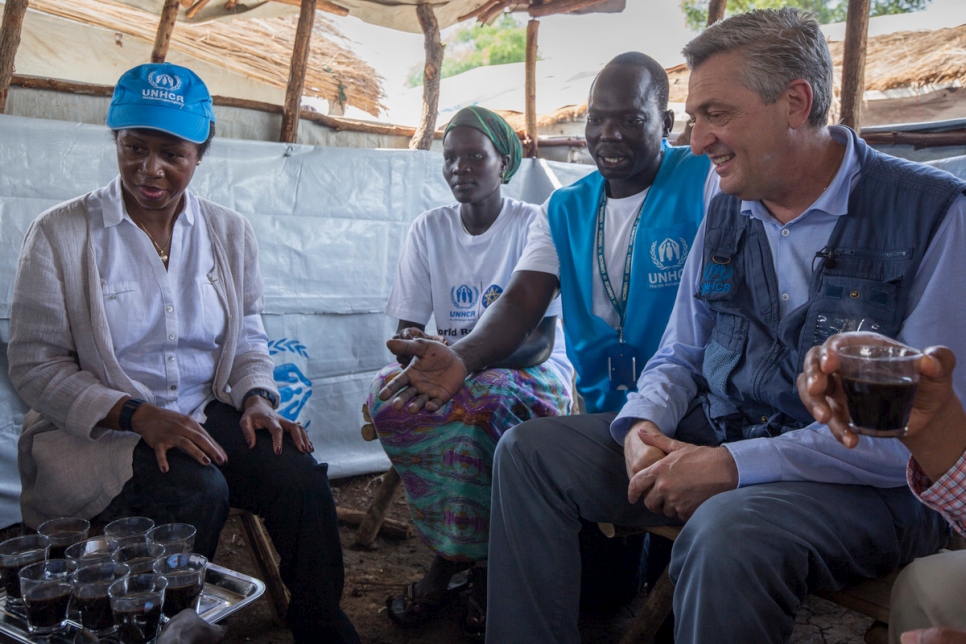UNHCR chief urges African leaders to tackle displacement
In an address to members of the African Union, Filippo Grandi calls on governments to end the conflicts that cause millions to flee.

United Nations High Commissioner for Refugees Filippo Grandi visits a coffee shop run by two South Sudanese refugees in Nguenyyie camp, Ethiopia. © UNHCR/Petterik Wiggers
ADDIS ABABA, Ethiopia - African countries have shown great generosity in hosting the continent’s refugees, but member states must do more to address the root causes of regional displacement, the UN refugee chief told a meeting of regional leaders.
UN High Commissioner for Refugees Filippo Grandi made the appeal in an address to the African Union Peace and Security Council meeting in the Ethiopian capital, Addis Ababa, on Wednesday (June 21).
Grandi stressed that humanitarian aid was not a solution for the more than 17 million displaced people in Sub-Saharan Africa. He said the region needed to develop better early warning systems and diplomacy to help prevent conflict before it caused displacement.
“The AU plays a fundamental role in addressing the circumstances that drive displacement today, and I urge you to place the plight of the displaced at the centre of your engagement in situations affected by fragility and conflict,” he said.
“The search for solutions to these and other displacement crises is fundamentally linked to addressing the root causes that drive and accelerate division and violent conflict,” he added.
The High Commissioner called on regional countries to address human rights violations and impunity in order to “deepen democracy and good governance across the continent,” he said.
Grandi highlighted the deteriorating situation in South Sudan, which is the fastest growing displacement crisis in the world. Nearly four million South Sudanese people have fled their homes, half to neighboring counties.
"Place the plight of the displaced at the centre of your engagement in situations affected by fragility and conflict.”
“It is almost as if the country is emptying itself,” he said referring to a visit he made to South Sudan a few days earlier. “The displaced people I spoke to had one strong common message: the need for peace, and for strong responsible political leadership to bring that about.”
The High Commissioner was in Addis Ababa during a visit to Africa that began in South Sudan last week and culminates with a Solidarity Summit on Refugees in the Ugandan capital, Kampala, on Friday.
In South Sudan, the High Commissioner visited sites in Juba and Bentiu where some of the country’s nearly two million displaced people live. Besides conflict, millions of South Sudanese are fleeing drought and famine.
During a visit to Gambella, Ethiopia, on World Refugee Day on June 20, he highlighted the right for refugees to receive an education.
The country hosts nearly 850,000 refugees in total, the majority from South Sudan, Somalia and Eritrea. He praised the Ethiopian government and people for their long history and continuing tradition of welcoming refugees, even in the face of the ongoing emergency in South Sudan.
Ethiopia’s foreign minister said his country would continue to keep its borders, and its hearts, open to refugees.
As part of last year’s New York Declaration on Refugees and Migrants, Ethiopia, along with Uganda, Tanzania, Djibouti and Somalia have committed to developing programmes and policies that take a more comprehensive approach to meeting the needs of refugees and the communities hosting them.
Grandi said these countries, which have been hosting refugees for decades, “have something to teach the rest of the world.” However, he stressed that their generosity should not be taken for granted and needed more support so they could continue to flourish.
The High Commissioner plans to emphasize the need for greater sharing of responsibility for refugees worldwide when he addresses the Kampala summit on Friday.
About 500 delegates are expected to attend, including heads of government, UN and financial institutions, and non-governmental organizations.
